 Among the nominations for the Top Ten Open Water Swimming Moments in History, Britain’s success in the Olympic 10K Marathon Swim in Beijing was among the nominations. With 2 silver medals and a bronze in the Olympic 10K, British swimmers took 50% of the total available medals - poetic justice for the country with the English Channel.
Among the nominations for the Top Ten Open Water Swimming Moments in History, Britain’s success in the Olympic 10K Marathon Swim in Beijing was among the nominations. With 2 silver medals and a bronze in the Olympic 10K, British swimmers took 50% of the total available medals - poetic justice for the country with the English Channel. British Swimming’s Open Water Performance Manager Mark Perry believes the subsequent public enthusiasm and support shown towards open water, from both the swimming community and the general public, will be a major factor in its continued success.
British Swimming’s Open Water Performance Manager Mark Perry believes the subsequent public enthusiasm and support shown towards open water, from both the swimming community and the general public, will be a major factor in its continued success.While Beijing was an obvious success based on the medals won by Keri-Anne Payne, Cassandra Patten (shown above) and David Davies (shown swimming to the left), Perry knows it will take an even greater effort to build on those results.
"We’ve come a long way in a relatively short time and achieved some wonderful results,” said Perry. “This is a testament to all who’ve been involved in the open water program and journey to Beijing, but in reality this is just the start – there’s still so much more to be done and work towards."
 "The success we saw in Beijing has drawn a great deal of attention to open water swimming from many coaches, athletes, the media and the public as a whole. It’s created a very positive attitude towards the discipline and sets us up perfectly in terms of preparations for London 2012. Britain has done a great job in terms of open water swimming, but the rest of the world will undoubtedly catch up. We’ve got a lot of momentum currently and that can only help to grow the sport in this country."
"The success we saw in Beijing has drawn a great deal of attention to open water swimming from many coaches, athletes, the media and the public as a whole. It’s created a very positive attitude towards the discipline and sets us up perfectly in terms of preparations for London 2012. Britain has done a great job in terms of open water swimming, but the rest of the world will undoubtedly catch up. We’ve got a lot of momentum currently and that can only help to grow the sport in this country."With long-term planning and vision, Perry was asked to take a relatively unappreciated aquatic discipline to a sport that would be competitive on the Olympic stage.
 "I identified changes that needed to be made. I saw the competition, other strong nations and got very excited about it and what marathon swimming had to offer. When I first got involved and took on the sport it was in need of modernization. We knew we had really good swimmers out there with lots of young talent coming through the ranks. The first thing we did was to try to recruit these top swimmers and brought on board Keri-Anne Payne, Cassie Patten and David Davies immediately. We want to make the most of the new-found interest now and extend this even further, encourage more athletes to explore the possibility of marathon swimming and to provide them with the right opportunities at the right time."
"I identified changes that needed to be made. I saw the competition, other strong nations and got very excited about it and what marathon swimming had to offer. When I first got involved and took on the sport it was in need of modernization. We knew we had really good swimmers out there with lots of young talent coming through the ranks. The first thing we did was to try to recruit these top swimmers and brought on board Keri-Anne Payne, Cassie Patten and David Davies immediately. We want to make the most of the new-found interest now and extend this even further, encourage more athletes to explore the possibility of marathon swimming and to provide them with the right opportunities at the right time." Perry prefers to look at who is swimming the 800 meter and 1500 meter freestyle events and think about what they would be like at 10K. British Swimming tries to help its teams give every distance swimmer in Britain the opportunity to swim an appropriate open water event. This vision resulted in each of Olympic open water swimming also swimming pool events in Beijing - with 2 of them finaling: Cassandra in the 800 freestyle and David in the 1500 freestyle. Keri-Anne swam not completely tapered for the 200 and 400 individual medleys in Beijing, but was ready for the 10K. Her coach Sean Kelly said, "[Keri-Anne] had the much bigger medal chance here [in the Olympic 10K]."
Perry prefers to look at who is swimming the 800 meter and 1500 meter freestyle events and think about what they would be like at 10K. British Swimming tries to help its teams give every distance swimmer in Britain the opportunity to swim an appropriate open water event. This vision resulted in each of Olympic open water swimming also swimming pool events in Beijing - with 2 of them finaling: Cassandra in the 800 freestyle and David in the 1500 freestyle. Keri-Anne swam not completely tapered for the 200 and 400 individual medleys in Beijing, but was ready for the 10K. Her coach Sean Kelly said, "[Keri-Anne] had the much bigger medal chance here [in the Olympic 10K]." "A large part of the focus of the program is to work from the grass roots up," explained Perry. "It involves meeting the different regions throughout Britain and liaising with those working with young talent, not only coaches but those working in the background. All involved in swimming need to drive this initiative forward. Before Beijing and the fantastic British performances, when I was on the pool deck at major meets, I used to get asked about boats and binoculars. Now the coaches are asking me how they and their swimmers can get involved. The shift in attitude towards the sport has been a massive one. There’s a lot of interest now from swimmers and coaches alike and the challenge we face now is facilitating that throughout 2009."
"[Open water swimming] used to be seen as a separate entity, sometimes a completely different sport, but I want to change all of that,” said the visionary Perry. “It’s an integral part of the World Class Events Programme and there’s no bigger testament to this than the results from 2008. All medalists came from a impressive pool background and together with our knowledge, experience and commitment to open water swimming, it’s transition into the world class programme has been seamless."
"The priority of the work we do is in looking after the athletes and making sure they have all the resources they need. It’s also about working very closely with their coaches. This has created a great rapport which provides a very close-knit team when we compete. The aim isn’t to create specialists in open water swimming, but rather to keep swimmers excelling in both open water and pool-based competitions."
Very wisely, Perry works closely with Development Coach Chris Martin to identify open water opportunities, but the priority is not short-term results oriented. With incredible foresight and patience, the focus is on giving the British athletes the right experience to lead to winning medals at the Olympics.
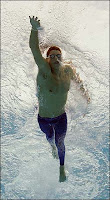 "This year we’ll be taking our athletes and giving them experience and exposure at international level. We’ll be highlighting talent and working with them to develop themselves,” said Perry. “The event in Britain has come a long way in a short space of time, but our strategy going forward will focus on developing technique and gaining experience. Leading into 2008, [Keri-Anne and Cassandra] were fairly experienced. They had a good track record and experiences of international events. They didn’t always go to events to win. It was about swimming the race, gaining more experience and creating a better understanding of the event. Before the Beijing Olympics, David Davies (shown to left) had very little experience and therefore his plan was to stay out in front and out of trouble. There wasn’t a British directive to go out in both races from the front, it fell down to the athletes and how the race developed."
"This year we’ll be taking our athletes and giving them experience and exposure at international level. We’ll be highlighting talent and working with them to develop themselves,” said Perry. “The event in Britain has come a long way in a short space of time, but our strategy going forward will focus on developing technique and gaining experience. Leading into 2008, [Keri-Anne and Cassandra] were fairly experienced. They had a good track record and experiences of international events. They didn’t always go to events to win. It was about swimming the race, gaining more experience and creating a better understanding of the event. Before the Beijing Olympics, David Davies (shown to left) had very little experience and therefore his plan was to stay out in front and out of trouble. There wasn’t a British directive to go out in both races from the front, it fell down to the athletes and how the race developed."Perry believes results in Beijing were even more impressive when you appreciate, unlike other countries, Britain has only June through August in which to compete in open water due to its climate.
"Our aim is to be a world leader in terms of open water racing. More races and events will go towards building experience and knowledge. It’s about being able to react to certain situations and the best way of managing this is through experience," said Perry.
"2012 is our next big event, but we have World Championships in open water every year. Other than that it’s a learning curve we’ll go through to be up there at the very top in time for London. We need to develop our race plans and this will require more events and opportunities on the calendar. The race plan is a massive element of open water swimming. It’s all important."
"Training for the open water and the pool-based events should be the same. We’ve been very successful with our swimmers following pool-focused training regimes. The only additional training requirement they’ve undergone is in the tactics of the race and this is something that comes from exposure to competition."
In summary: impressive planning, admirable vision, great execution.
Photo of David Davies by the Telegraph and Cameron Spencer of Getty Images AsiaPac.


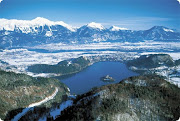
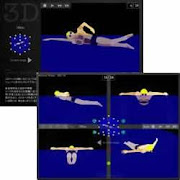
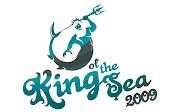



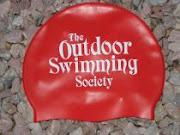




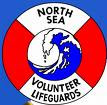
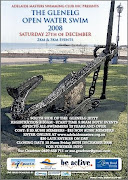





1 comment:
I like this post..
tasmania accommodation
Post a Comment